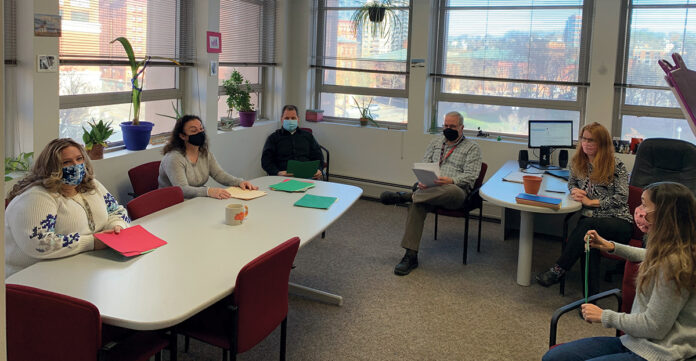
PBN DIVERSITY & INCLUSIONS 2020 AWARDS
Government: R.I. Office of Rehabilitation Services
FOR RON RACINE, promoting diversity and inclusiveness in the workplace is a critical component to success.
Racine, the associate director at the R.I. Office of Rehabilitation Services – a branch of the R.I. Department of Human Services – said the office cannot be effective if it does not understand how staff and clients are feeling. Morale and productivity will suffer, Racine said, even if one does not feel they have the same opportunities as everyone else.
“We need to understand our implicit biases, engage in self-reflection and communicate openly. We all need to strive to make our culture better,” Racine said.
With the overarching mission to “empower individuals with disabilities to choose, prepare for, obtain, advance and maintain employment, economic self-sufficiency, independence and integration into society as a guide,” the ORS Vocational Rehabilitation program assists individuals with disabilities so that they can be gainfully employed.
According to Racine, the return on investment on the vocational rehab program is high. Data from ORS shows that for every dollar spent on the program, $15 to $17 is returned to the economy in taxes that the worker pays, becoming less reliant on public benefits as a result.
“Aside from it being a good business and economic decision, by having an employee with a disability on staff, businesses can learn from those individuals who are essentially a free subject-matter expert that can help the business,” Racine said. “We always hear from employers how lucky they were to hire someone with a disability, as they have learned so much from them.”
While serving as the lead agency for the assistive-technology access partnership, ORS also offers services for the blind and visually impaired, including independent-living services, children’s services and its business-enterprises program. Disability Determination Services, a unit within ORS funded through the Social Security Administration, determines eligibility for all Rhode Islanders who apply for Supplemental Security Income and Social Security Disability Insurance benefits.
The agency helped 425 individuals with disabilities find employment in the 2018 program year. Additionally, 2,565 individuals received services, such as evaluations, medical and psychological therapies, personal-assistant services, job placement and training, that were purchased from vendors; 114 individuals received rehabilitation-technology services to help enter employment; and 1,500 youths with disabilities received pre-employment transition services.
While the ongoing COVID-19 pandemic has presented ORS internal operational challenges, Racine said individuals with disabilities have been disproportionately affected by layoffs and reduced work hours due to the crisis. Because of this, Racine expects ORS to see more applications come to the office.
Many ORS counselors, even with in-person consultations being limited currently due to the pandemic, have been pressing forward by creating or updating clients’ resumes, as well as providing direct job referrals and information on employment opportunities and hiring events.
“Some of the challenges include identifying vocational services and providers to keep cases moving forward in a timely manner,” ORS Assistant Administrator Michael Montanaro said. “The importance of this is to keep clients engaged in services and to complete possible continuum of services, including vocational evaluations, community-based work experiences and job development and placement.”
Hugely beneficial to this ongoing effort is the creation of the business engagement specialist team, or BEST. The group is designed to support businesses as a secondary consumer, facilitating disability awareness, technical assistance, accessibility and assistive-technology consultation, and meeting business hiring needs. A BEST website, still being built, will include information for employers about tax incentives, assistive-technology and services that ORS may assist individuals with.
“We fill in the gaps where no one even knows one exists,” Montanaro said. “What makes the BEST team passionate about the work we do is the fact that we get to use our knowledge and expertise to make meaningful differences in the lives of people with a disability. We are also actively involved in the schools, providing that initial employment opportunity to students with disabilities in partnership with school departments and educational-service agencies. These students could be the employees of the future.”












